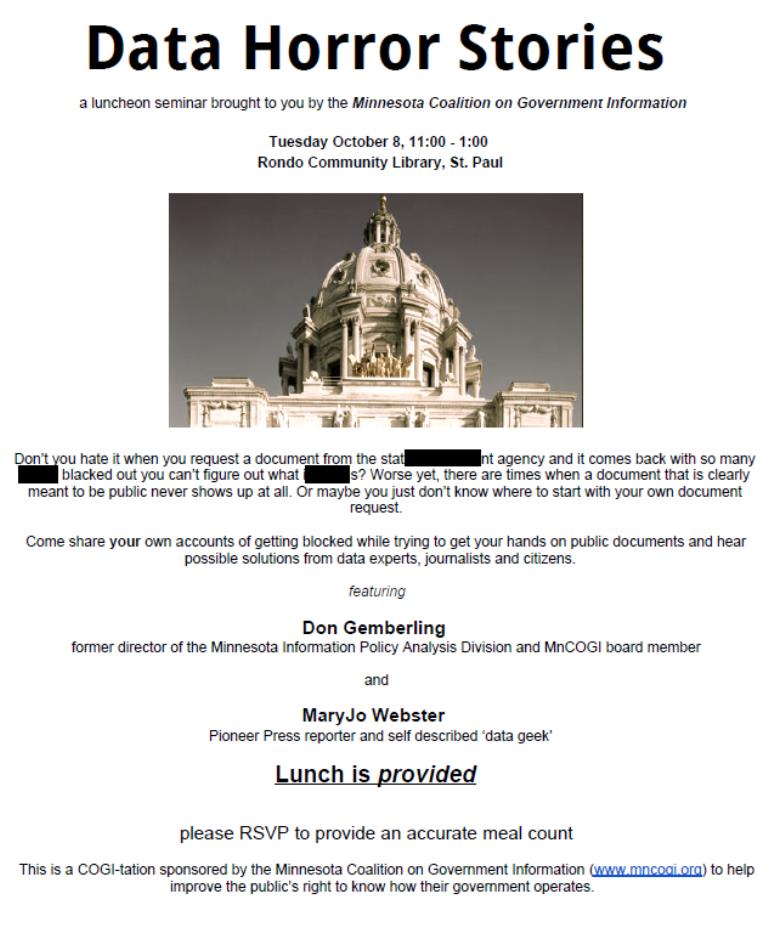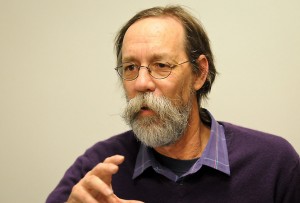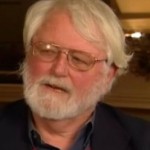I attended the National Freedom of Information Coalition 2013 FOI Summit in New Orleans last month. The NFOIC has posted a wrap-up page with videos of the Saturday panels and the keynote address.
In addition to the presentations on Saturday, panels on Friday afternoon brought together the attendees to talk about nuts-and-bolts issues of running a state freedom of information group, like fund-raising and maintaining a website. The conversation was informal and part of the aim was to share news of activities in the states.
In the session titled “Yes, You CAN … on a Shoestring,” the speakers were ardent advocates for getting involved in the legislative process. Across the country there are a few states that hire and pay lobbyists. Many other states are in a situation similar to Minnesota, where the group is a 501c3 educational group and “lobbying” is only done informally and without pay by members of the groups. The comments were valuable for both types of situations.
 Megan Rhyne, the Executive Director of the Virginia Coalition for Open Government, said that if you want to lobby, you should and you can. The benefits are so much greater than the time you spend in the chambers. Since the VA Legislature meets only two months each year, most lobbying is done during the interim. During the session, she makes almost daily trips to walk the halls, meet with legislators, and attend committee hearings to testify or watch. Some of her most useful conversations and contacts over the years have taken place when she didn’t expect it – in a bathroom washing her hands, or while chatting with lobbyists of other groups that may have similar interests. Half of lobbying is just showing up. You are not only talking with legislators, but also meeting other stakeholders. Lobbying gives your group a good public relations platform to reach out to donors and constituents. With information from the capitol you have instant content for your social media outlets. It gives you a way to get your members involved; you can inform members about what they can do about various issues and bills, and who they should contact.
Megan Rhyne, the Executive Director of the Virginia Coalition for Open Government, said that if you want to lobby, you should and you can. The benefits are so much greater than the time you spend in the chambers. Since the VA Legislature meets only two months each year, most lobbying is done during the interim. During the session, she makes almost daily trips to walk the halls, meet with legislators, and attend committee hearings to testify or watch. Some of her most useful conversations and contacts over the years have taken place when she didn’t expect it – in a bathroom washing her hands, or while chatting with lobbyists of other groups that may have similar interests. Half of lobbying is just showing up. You are not only talking with legislators, but also meeting other stakeholders. Lobbying gives your group a good public relations platform to reach out to donors and constituents. With information from the capitol you have instant content for your social media outlets. It gives you a way to get your members involved; you can inform members about what they can do about various issues and bills, and who they should contact.
Lobbying doesn’t always change the outcome of legislation, but sometimes it does. For many bills, it is helpful to identify citizens who can testify.
Sometimes coalitions can be pigeonholed as just spokespeople for open media issues and for the concerns of journalists – but the coalitions represent more, they represent open government for all citizens. You are an embodiment of the peoples’ right to know. Keeping close contact with the media is useful; journalists like to write articles about bills that will affect them directly, and they will be looking for spokespeople.
 Hyde Post, a journalist and consultant from Georgia, said that their group looks at education as a form of long-term lobbying. Lobbying at the legislature is a form of triage. Often you are working to prevent the doors of open government from being shut. How do you prevent that? Build a basic education workshop that you can transport anywhere. Make it your business to get in front of newly-elected or newly-appointed public officials, like state court judges, or school board members, or sheriffs, even legislators School board officials are often those least-savvy about public openness issues, he noted, since many come from the private sector. If you make contacts with people at an educational seminar and they see you at the Capitol some time later, they will know you, before there is a crisis with a specific bill and you are heading off legislation at the pass.
Hyde Post, a journalist and consultant from Georgia, said that their group looks at education as a form of long-term lobbying. Lobbying at the legislature is a form of triage. Often you are working to prevent the doors of open government from being shut. How do you prevent that? Build a basic education workshop that you can transport anywhere. Make it your business to get in front of newly-elected or newly-appointed public officials, like state court judges, or school board members, or sheriffs, even legislators School board officials are often those least-savvy about public openness issues, he noted, since many come from the private sector. If you make contacts with people at an educational seminar and they see you at the Capitol some time later, they will know you, before there is a crisis with a specific bill and you are heading off legislation at the pass.
This is just a small piece of the interesting session. Another important topic was fund-raising, a crucial aspect of the life of any small nonprofit. Hyde Post from Georgia said that their group began as an organization with $15,000 a year and has grown from there. “We are always on the precipice of running out of money. If you aren’t worrying about money all the time, I want to meet you, because you probably have a lot of it and I’d like some.” He also pulled out his phone from his pocket and the small credit card reader that hooks onto it. He said that everyone in the room needed one. That way if you are talking with anyone who might have an interest in donating to your group, you are ready to take a donation, then and there.
The Summit was well-run, the speakers were engaging, and my overall reaction was regret that I had not attended the summits in previous years!
Robbie LaFleur


 Megan Rhyne, the Executive Director of the Virginia Coalition for Open Government, said that if you want to lobby, you should and you can. The benefits are so much greater than the time you spend in the chambers. Since the VA Legislature meets only two months each year, most lobbying is done during the interim. During the session, she makes almost daily trips to walk the halls, meet with legislators, and attend committee hearings to testify or watch. Some of her most useful conversations and contacts over the years have taken place when she didn’t expect it – in a bathroom washing her hands, or while chatting with lobbyists of other groups that may have similar interests. Half of lobbying is just showing up. You are not only talking with legislators, but also meeting other stakeholders. Lobbying gives your group a good public relations platform to reach out to donors and constituents. With information from the capitol you have instant content for your social media outlets. It gives you a way to get your members involved; you can inform members about what they can do about various issues and bills, and who they should contact.
Megan Rhyne, the Executive Director of the Virginia Coalition for Open Government, said that if you want to lobby, you should and you can. The benefits are so much greater than the time you spend in the chambers. Since the VA Legislature meets only two months each year, most lobbying is done during the interim. During the session, she makes almost daily trips to walk the halls, meet with legislators, and attend committee hearings to testify or watch. Some of her most useful conversations and contacts over the years have taken place when she didn’t expect it – in a bathroom washing her hands, or while chatting with lobbyists of other groups that may have similar interests. Half of lobbying is just showing up. You are not only talking with legislators, but also meeting other stakeholders. Lobbying gives your group a good public relations platform to reach out to donors and constituents. With information from the capitol you have instant content for your social media outlets. It gives you a way to get your members involved; you can inform members about what they can do about various issues and bills, and who they should contact. Hyde Post, a journalist and consultant from Georgia, said that their group looks at education as a form of long-term lobbying. Lobbying at the legislature is a form of triage. Often you are working to prevent the doors of open government from being shut. How do you prevent that? Build a basic education workshop that you can transport anywhere. Make it your business to get in front of newly-elected or newly-appointed public officials, like state court judges, or school board members, or sheriffs, even legislators School board officials are often those least-savvy about public openness issues, he noted, since many come from the private sector. If you make contacts with people at an educational seminar and they see you at the Capitol some time later, they will know you, before there is a crisis with a specific bill and you are heading off legislation at the pass.
Hyde Post, a journalist and consultant from Georgia, said that their group looks at education as a form of long-term lobbying. Lobbying at the legislature is a form of triage. Often you are working to prevent the doors of open government from being shut. How do you prevent that? Build a basic education workshop that you can transport anywhere. Make it your business to get in front of newly-elected or newly-appointed public officials, like state court judges, or school board members, or sheriffs, even legislators School board officials are often those least-savvy about public openness issues, he noted, since many come from the private sector. If you make contacts with people at an educational seminar and they see you at the Capitol some time later, they will know you, before there is a crisis with a specific bill and you are heading off legislation at the pass.

